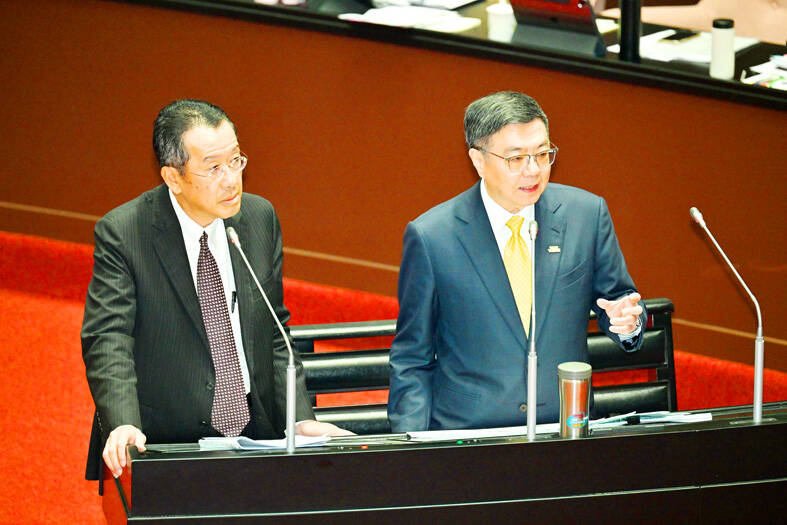Government agencies are expected to draft a plan within one month that would amend the Military Trial Act (軍事審判法) to reinstate courts martial, Premier Cho Jung-tai (卓榮泰) said at the legislature in Taipei yesterday.
The premier’s comments came after President William Lai (賴清德) on Thursday following a national security meeting announced that China constituted “a hostile foreign force” and that the government would seek to reinstate the military court system to handle military-related criminal cases involving active-duty members of the armed forces, amid increasing Chinese infiltration attempts.
Democratic Progressive Party Legislator Lai Jui-lung (賴瑞隆) asked when the Cabinet would present supplementary measures to the announcement.

Photo: Tien Yu-hua, Taipei Times
All agencies have been instructed to establish task forces and formulate action plans to realize the president’s instructions, Cho said.
The government has contingencies prepared for such a development and agencies need to communicate with each other to finalize plans within the month, Cho said.
The current military trial system is only to be used during war time, Chinese Nationalist Party (KMT) Legislator Alicia Wang (王育敏) said.
“Is the president’s instruction to restore such a system a precursor that Taiwan is to enter wartime preparations?” Wang asked.
The amendment targets specific actions, such as rebellion among serving military personnel, collaboration with the enemy, leaking intelligence, abandonment of duty or disobeying direct orders, Cho said.
“The abolition of military courts in 2013 was in response to a public outcry following human rights infringements against serving military personnel, but we are now faced with foreign actors enticing active military personnel to act in ways that are against the country’s interests,” he said.
Lai’s 17 strategies to counter Chinese infiltration, from reinstating the military court system to enhancing scrutiny of immigrants from China, Hong Kong and Macau, have caused the public to feel that their freedom of speech and movement, as well as cross-strait interactions, are being threatened, Wang said.
“The proposed changes make it seem that exchanges with China would be seen as taking the side of the Chinese Communist Party,” she added.
Fostering healthy and orderly cross-strait interactions is still a standing government policy, Cho said.
Separately yesterday, Minister of National Defense Wellington Koo (顧立雄) — who in 2013 supported the abolition of the military court system — said that he has not changed his stance, adding that the Lai administration’s plan to reinstate military courts should be seen as fostering a new system that observes legal procedure and is conducted fairly, rather than the reinstatement of the previous system.
The Ministry of National Defense is proposing amendments to legislation to ensure that courts martial would not be seen as an extension of an authoritarian regime and are instead part of a system that maintains military discipline while upholding human rights, Koo said.
Additional reporting by Fang Wei-li

DEFENSE: The National Security Bureau promised to expand communication and intelligence cooperation with global partners and enhance its strategic analytical skills China has not only increased military exercises and “gray zone” tactics against Taiwan this year, but also continues to recruit military personnel for espionage, the National Security Bureau (NSB) said yesterday in a report to the Legislative Yuan. The bureau submitted the report ahead of NSB Director-General Tsai Ming-yen’s (蔡明彥) appearance before the Foreign and National Defense Committee today. Last year, the Chinese People’s Liberation Army (PLA) conducted “Joint Sword-2024A and B” military exercises targeting Taiwan and carried out 40 combat readiness patrols, the bureau said. In addition, Chinese military aircraft entered Taiwan’s airspace 3,070 times last year, up about

A magnitude 4.3 earthquake struck eastern Taiwan's Hualien County at 8:31am today, according to the Central Weather Administration (CWA). The epicenter of the temblor was located in Hualien County, about 70.3 kilometers south southwest of Hualien County Hall, at a depth of 23.2km, according to the administration. There were no immediate reports of damage resulting from the quake. The earthquake's intensity, which gauges the actual effect of a temblor, was highest in Taitung County, where it measured 3 on Taiwan's 7-tier intensity scale. The quake also measured an intensity of 2 in Hualien and Nantou counties, the CWA said.

The Overseas Community Affairs Council (OCAC) yesterday announced a fundraising campaign to support survivors of the magnitude 7.7 earthquake that struck Myanmar on March 28, with two prayer events scheduled in Taipei and Taichung later this week. “While initial rescue operations have concluded [in Myanmar], many survivors are now facing increasingly difficult living conditions,” OCAC Minister Hsu Chia-ching (徐佳青) told a news conference in Taipei. The fundraising campaign, which runs through May 31, is focused on supporting the reconstruction of damaged overseas compatriot schools, assisting students from Myanmar in Taiwan, and providing essential items, such as drinking water, food and medical supplies,

New Party Deputy Secretary-General You Chih-pin (游智彬) this morning went to the National Immigration Agency (NIA) to “turn himself in” after being notified that he had failed to provide proof of having renounced his Chinese household registration. He was one of more than 10,000 naturalized Taiwanese citizens from China who were informed by the NIA that their Taiwanese citizenship might be revoked if they fail to provide the proof in three months, people familiar with the matter said. You said he has proof that he had renounced his Chinese household registration and demanded the NIA provide proof that he still had Chinese